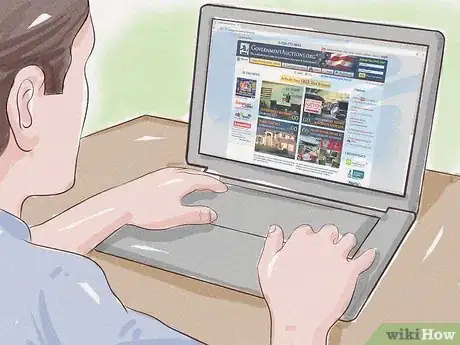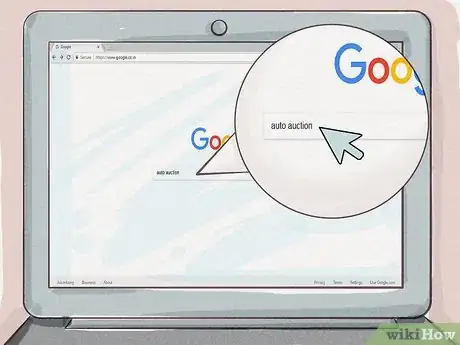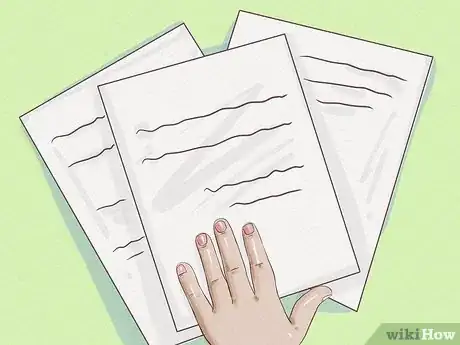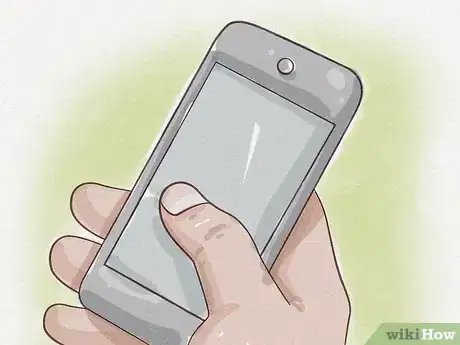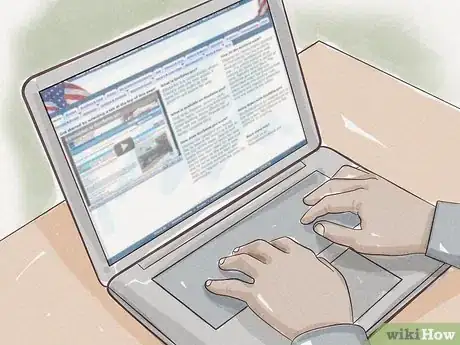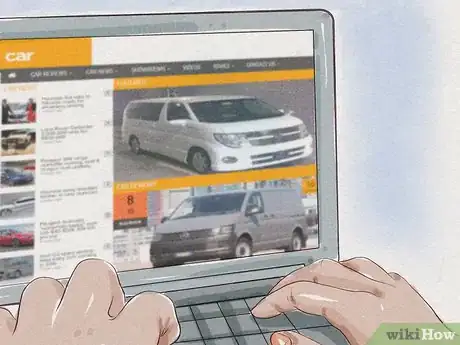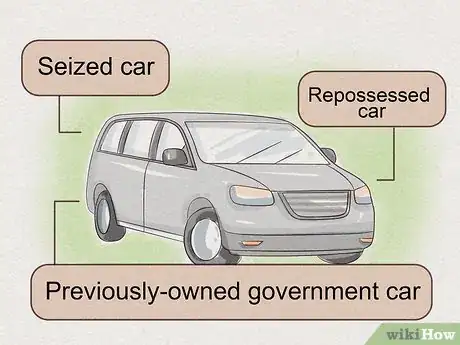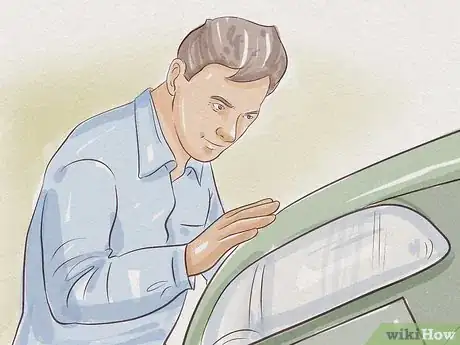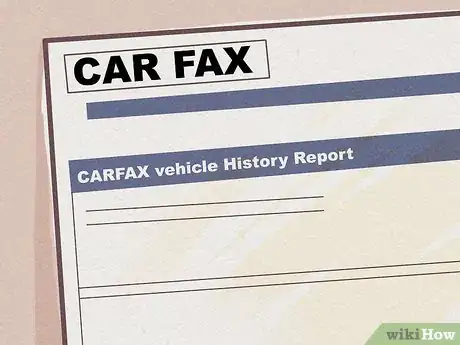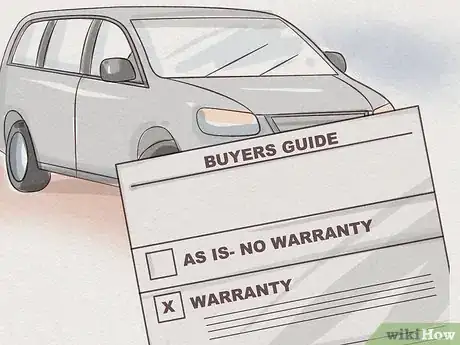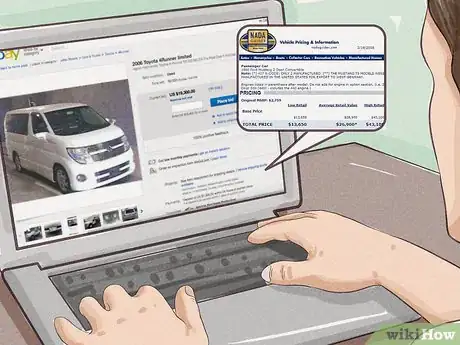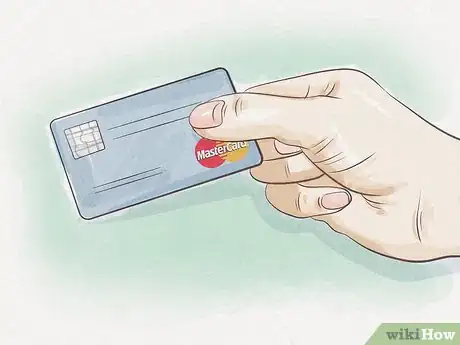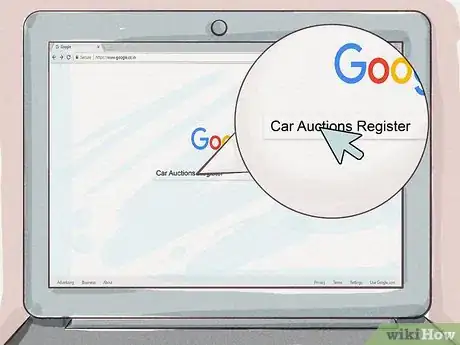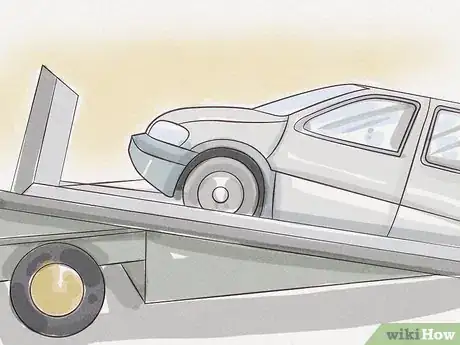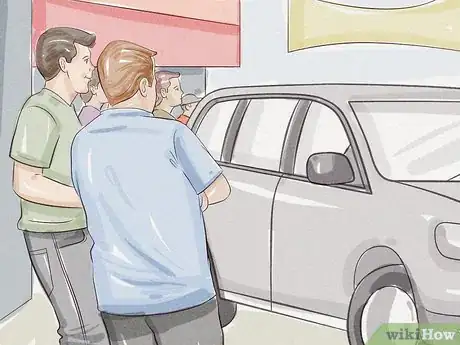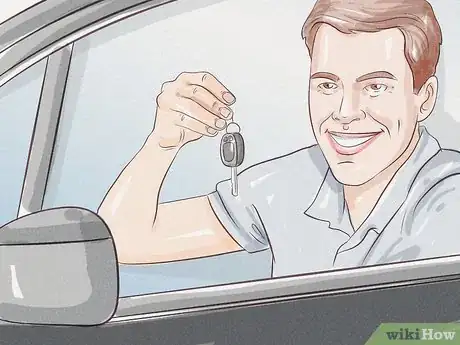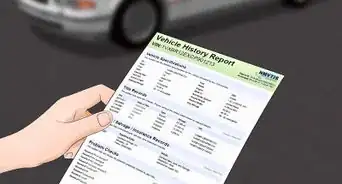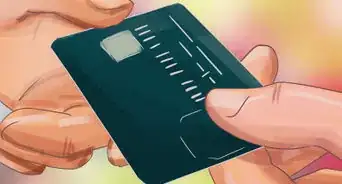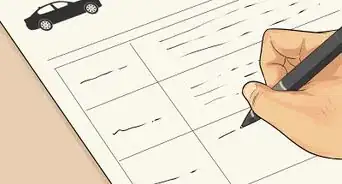This article was co-authored by Bryan Hamby. Bryan Hamby is the owner of Auto Broker Club, a trusted auto brokerage in Los Angeles, California. He founded Auto Broker Club in 2014 out of a passion for cars and a unique talent for customizing the car dealership process to be on the buyer’s side. With 1,400+ deals closed, and a 90% customer retention rate, Bryan’s focus is to simplify the car buying experience through transparency, fair pricing, and world class customer service.
This article has been viewed 125,755 times.
Thousands of cars are seized by banks, the government, and law enforcement agencies every year. Many of these vehicles will be put up for auction. You can buy a seized car for almost 90 percent off its retail value, so they're worth looking into if you're after a bargain.
Steps
Finding Seized Cars
-
1Search government auction sites. Start at the website https://www.govsales.gov. This website will tell you when an auction is taking place and its location.[1]
- Other good websites include governmentauctions.org and gov-auctions.org. These are privately-run sites that contain information about government auctions.
- You will have to create an account to use the privately-run websites. Many offer free trials, but you will have to pay when your free trial ends.
-
2Check other websites. Search “auto auction” and look for websites that have repossessed and seized cars for sale. Not all auto auction websites will. Instead, some specialize in antiques or estate sales. At the website, you should be able to peruse inventory.
- Avoid websites that require you to pay money before you can inspect a vehicle.[2]
Advertisement -
3Search print publications. These magazines often list auctions and seized cars for sale. However, be aware that sometimes the cars advertised aren’t the same as the cars you’ll see at the auction.
- Your local paper should also contain information about upcoming local auctions.
-
4Call up the police. Law enforcement might let you check out their cars, so call up and ask. They usually store cars at towing yards, and the police might let you go inspect what stock they have available.
-
5Contact lenders directly. Some banks or credit unions will let you look at their file of repossessed vehicles. You’ll be able to inspect a car and then make a bid for it. Lenders usually want to recoup their losses, so you can often get a good deal this way.[3] However, you’ll probably pay more than you will at an auction.
-
6Find dealers who specialize in repo sales. You can get a great discount from one of these sellers. Search online to find nearby sellers. You can buy a car without the high-pressure auction environment, which should give you more time to research the car.[4] Nevertheless, you’ll pay more than you would for a similar car at auction.
Researching Cars
-
1Choose cars you are interested in. Bank and auction sites should have a list of cars available. Check if there’s anything offered you are interested in. It’s great to get a car cheap, but there’s no reason to buy a sports car when what you need is a minivan. Identify the types of cars you are in the market for.[5]
-
2Figure out why the car is being sold. The difference between these reasons could potentially tell you a little more about the car. Typical reasons include:
- Seized car: This means the car was taken by law enforcement for either too many traffic violations or because it was confiscated in a raid. The car was most likely maintained by the owner before being seized. The IRS and courts tend to seize cars that have a higher value and are of better quality.
- Repossessed car: These cars are seized by lenders who haven’t been receiving payments. Since the former owner couldn’t repay their loan, they probably didn’t pay to maintain the car. These cars tend to be of lower quality.[6]
- Previously-owned government car: These cars were owned by government agencies that no longer need them. Most agencies frequently update their cars, so they tend to be high quality.
-
3Inspect the car. You might be able to inspect the car the day of the auction or before. Try to go before. When checking the car, look for new paint, dents, or rust. Each of these could hint at underlying problems.[7]
- Look under the hood if you know what to look for. If you don’t, ask a friend to go with you to see if the engine is in good shape.
- Vehicles are shown in the same condition that they were seized. So don’t be surprised if they are dirty inside.
-
4Ask for a car report. Many cars come with CarFax reports to give you the car’s full history, which should include information about prior accidents and repair. If you don’t get a CarFax report, you can run a report yourself using the VIN number. Visit the CarFax website.[8]
-
5Understand what you are getting. You might be able to get a car for a great price. However, there are some downsides that you should be aware of before you bid for a car at auction.
- For example, most cars are sold “as is,” meaning that no warranty or guarantee is made about the car.[9] In fact, many cars may be in terrible condition. Check if you can buy a warranty separately.[10]
- You also probably can’t test drive the vehicle, so you really won’t know with certainty what type of car you’re buying.
-
6Come up with a maximum price. Decide which vehicles you will bid on, and then come up with the absolute maximum you will bid for the car. If you’re having trouble setting the price, then look at sources such as the NADA guide.
- Also look at eBay to see how much people are paying for auctioned vehicles. Find cars with the same make and model as the cars you want to bid on.[11]
Attending the Auction
-
1Have payment ready. Generally, you need to have cash on hand or be preapproved for a loan in order to buy a car at auction.[12] However, some banks will have finance options available if it is a bank auction, so call ahead to check.
- You might also use a credit card, which is safer to carry than cash.[13]
-
2Register in advance.[14] Some auctions are open only to dealers, so it’s important to know in advance whether this is an auction you can actually attend.
-
3Arrive prepared. You’ll need some way to get the car off the lot. Don’t assume you’ll be able to start it. Many cars sit on the lot for a long time before auction. You may need to bring tools, oil, antifreeze, and an air pressure gauge.
- You may also need to tow the car home, so check if a two truck is nearby. Some auctions might also let you pay to store the car until you can get the car off the lot.
-
4Bid sensibly. Remember not to go over your maximum for each car. It’s very easy to get caught up in the excitement of an auction, so try to restrain yourself. Ask a friend to come along with you to help keep you in line.
-
5Buy your car. If your bid was the highest, congratulations—you’re the new owner! You need to make a deposit immediately after winning.[15] The deposit amount will be roughly 10% of the price.
- If you back out of the sale, then you’ll forfeit your deposit.
Expert Q&A
-
QuestionWhy would someone want to buy a seized car?
 Bryan HambyBryan Hamby is the owner of Auto Broker Club, a trusted auto brokerage in Los Angeles, California. He founded Auto Broker Club in 2014 out of a passion for cars and a unique talent for customizing the car dealership process to be on the buyer’s side. With 1,400+ deals closed, and a 90% customer retention rate, Bryan’s focus is to simplify the car buying experience through transparency, fair pricing, and world class customer service.
Bryan HambyBryan Hamby is the owner of Auto Broker Club, a trusted auto brokerage in Los Angeles, California. He founded Auto Broker Club in 2014 out of a passion for cars and a unique talent for customizing the car dealership process to be on the buyer’s side. With 1,400+ deals closed, and a 90% customer retention rate, Bryan’s focus is to simplify the car buying experience through transparency, fair pricing, and world class customer service.
Professional Auto Broker A lot of people are looking for very specific vehicles when they go to an auction. Either they can't find a specific model elsewhere, or there's something unique about the car that's attractive to them.
A lot of people are looking for very specific vehicles when they go to an auction. Either they can't find a specific model elsewhere, or there's something unique about the car that's attractive to them. -
QuestionCan anyone go to a fleet auction where a lot of seized cars are being sold?
 Bryan HambyBryan Hamby is the owner of Auto Broker Club, a trusted auto brokerage in Los Angeles, California. He founded Auto Broker Club in 2014 out of a passion for cars and a unique talent for customizing the car dealership process to be on the buyer’s side. With 1,400+ deals closed, and a 90% customer retention rate, Bryan’s focus is to simplify the car buying experience through transparency, fair pricing, and world class customer service.
Bryan HambyBryan Hamby is the owner of Auto Broker Club, a trusted auto brokerage in Los Angeles, California. He founded Auto Broker Club in 2014 out of a passion for cars and a unique talent for customizing the car dealership process to be on the buyer’s side. With 1,400+ deals closed, and a 90% customer retention rate, Bryan’s focus is to simplify the car buying experience through transparency, fair pricing, and world class customer service.
Professional Auto Broker It should say on the flyer or post whether the public is allowed to attend the auction or not. When it comes to fleet auctions, you typically need a license or some kind of credential to attend.
It should say on the flyer or post whether the public is allowed to attend the auction or not. When it comes to fleet auctions, you typically need a license or some kind of credential to attend. -
QuestionDo I have to have a driver's license to travel in my newly purchased vehicle?
 Community AnswerYou need a driver's license any time you drive. Depending on the distance and your locality, you will be asked for license and, at minimum, proof of purchase if you are pulled over.
Community AnswerYou need a driver's license any time you drive. Depending on the distance and your locality, you will be asked for license and, at minimum, proof of purchase if you are pulled over.
References
- ↑ Bryan Hamby. Professional Auto Broker. Expert Interview. 11 June 2019.
- ↑ https://www.trustedchoice.com/insurance-articles/wheels-wings-motors/buy-repo-cars/
- ↑ https://www.trustedchoice.com/insurance-articles/wheels-wings-motors/buy-repo-cars/
- ↑ http://www.autoblog.com/2010/10/26/how-to-buy-repo-vehicle/
- ↑ Bryan Hamby. Professional Auto Broker. Expert Interview. 11 June 2019.
- ↑ https://www.trustedchoice.com/insurance-articles/wheels-wings-motors/buy-repo-cars/
- ↑ Bryan Hamby. Professional Auto Broker. Expert Interview. 11 June 2019.
- ↑ https://www.carfax.com/vehicle-history-reports/
- ↑ https://www.trustedchoice.com/insurance-articles/wheels-wings-motors/buy-repo-cars/
- ↑ http://www.autoblog.com/2010/10/26/how-to-buy-repo-vehicle/
- ↑ http://www.autoblog.com/2010/10/26/how-to-buy-repo-vehicle/
- ↑ Bryan Hamby. Professional Auto Broker. Expert Interview. 11 June 2019.
- ↑ http://www.streetdirectory.com/travel_guide/53374/used_cars/paying_for_a_used_car_at_a_used_car_auction.html
- ↑ https://www.trustedchoice.com/insurance-articles/wheels-wings-motors/buy-repo-cars/
- ↑ https://www.trustedchoice.com/insurance-articles/wheels-wings-motors/buy-repo-cars/
About This Article
You can often buy seized cars for a heavily discounted price if you know where to find them. Look for government auctions at govsales.gov, which will give you the time and place of seized car auctions. If you’d rather avoid the pressure of an auction, search online for car repo sellers, who you can buy a car directly from. Some car magazines and local newspapers will also have adverts for seized car auctions and sales. If you’re interested in an auction, make sure it’s open to the public, since some auctions are only for car dealers. When buying a seized car directly, check the car for new paint, dents, or rust, which can indicate underlying problems. You should also ask for its CarFax report if the dealer has it so you can see the car’s history and assess its value. For more tips, including how to prepare for an auction, read on!
